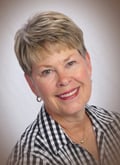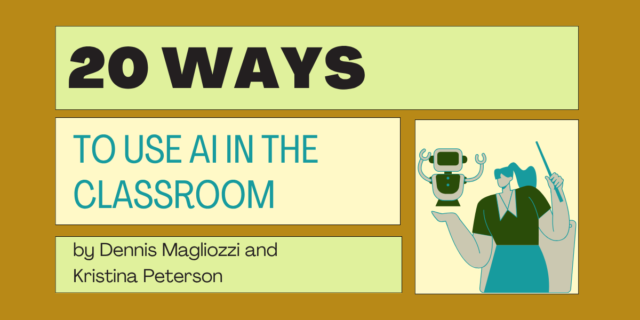
by Judy Wallis
The session had just ended at the conference I was attending. I watched as a renowned literacy educator walked toward the group of young presenters to congratulate them on the smart ideas they’d shared. Though I was already standing and ready to leave, I lingered to watch the exchange. I thought back to my earliest days as an educator and the sessions I’d delivered. I thought about how unsure I’d felt on occasions. I thought about how passionately I’d shared ideas and pondered whether or not they were sound. And then I thought about how exhilarating this must be for those young professionals as they embark on the work of a lifetime. I watched the presenters engage in conversation and receive congratulations, and I thought that this is indeed the pinnacle of professionalism.
Michael Fullan explains in his fine text, The Six Secrets of Change (2008) that high-quality leaders invest in the continuous development of their employees. I don’t doubt that many of us see the importance of this within an organization—our own school or district. However, I’d like to propose that nurturing others as they work to recognize their goals may be the most important professional work in which we engage.
In my own career as a language arts director in two large districts, I was often asked if I felt disappointed that a program had shifted direction after I left. There are many possible answers to that question. What I’ve come to realize is that though the programs we help to build, the books and articles we write, and the presentations we deliver are all important contributions, we really only live on in people. My new metric for greatness is not counted in books, papers, and presentations; but rather counted in those we inspire and support and encourage to achieve their own work.
We really only live on in people
I was a brand new director in 1988, and I was eager to make the teaching of writing a priority in my district. I’d read Writing: Teachers and Children at Work (Graves, 1983)—or the “brown book” as we affectionately named it. So I called Don Graves and invited him to the district. He came two summers in a row to hold writing retreats where well over one hundred teachers and principals gathered. He inspired, coached, and nurtured each one of us in unique ways. Teachers left with a new sense of urgency and agency that they, too, could become a teacher of writing. Over the years, I reconnected with Don at conferences, and every so often—almost as though a mind reader—he would send me a note of encouragement or congratulations. Those notes are still tucked away in a drawer from which I occasionally pull and reread them. And there are dozens of others who share this same story. By the time Don left us, he’d left a legacy in us—a whole community of those he inspired.
Don Graves serves as a good model for all of us about living within a professional community of teachers and learners. There are others, too, who come to my mind and I suspect come to yours. When I say their names, I envision a surrounding constellation of those they’ve inspired, nurtured, and supported. I see their contributions and the work that often began with one spread among many in the service of others.
Today, education is fraught with both big and small challenges. Rarely does a day pass that critics don’t point to what is wrong instead of all that is right in education. Two years ago, I wrote a commentary suggesting that we begin a “joy revolution.” Today, I can’t help but wonder how our profession might change if we assessed the value of our individual work in the nurture and inspiration we offered others. What would happen if we reminded ourselves each day that our lives in education are always about “us”? So let’s reflect on those who have supported and inspired us in our own educational journey, take time to express our gratitude, and then, be that person for others.
♦ ♦ ♦ ♦
 Judy Wallis has spent the past four decades as a teacher, literacy coach, staff developer, and university instructor. She served two large, diverse, Houston, Texas school districts as language arts director and provided leadership support for literacy coaches for 21 years. Her professional interests and work focus on leadership and whole-school/district change through robust literacy instruction. She currently works with schools and districts across the country as a staff developer and educational consultant. Her work has focused on linking research and practice and bringing out the strengths in others. Judy has authored a number of professional book chapters and articles and wrote the “Blue Pages” in Conversations with Regie Routman. Her books, Comprehension Intervention, K–2 and Comprehension Intervention, 3–6, were coauthored with Stephanie Harvey and Anne Goudvis. She received the 2014 Edmund J. Farrell Lifetime Service Award from Texas Council Teachers of English Language Arts.
Judy Wallis has spent the past four decades as a teacher, literacy coach, staff developer, and university instructor. She served two large, diverse, Houston, Texas school districts as language arts director and provided leadership support for literacy coaches for 21 years. Her professional interests and work focus on leadership and whole-school/district change through robust literacy instruction. She currently works with schools and districts across the country as a staff developer and educational consultant. Her work has focused on linking research and practice and bringing out the strengths in others. Judy has authored a number of professional book chapters and articles and wrote the “Blue Pages” in Conversations with Regie Routman. Her books, Comprehension Intervention, K–2 and Comprehension Intervention, 3–6, were coauthored with Stephanie Harvey and Anne Goudvis. She received the 2014 Edmund J. Farrell Lifetime Service Award from Texas Council Teachers of English Language Arts.
* Photo by Dustin Lee


